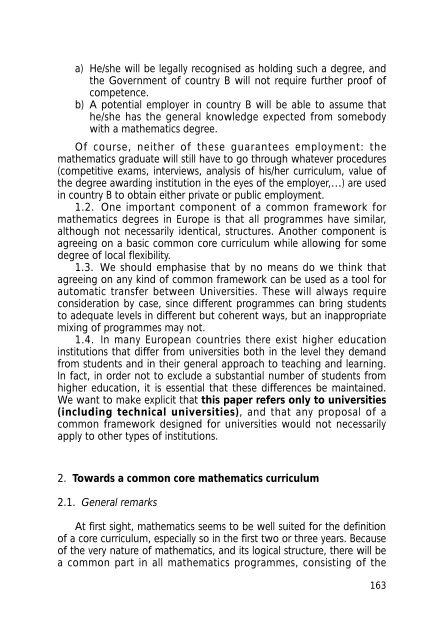Final Report Pilot Project - Relaciones Internacionales de la ...
Final Report Pilot Project - Relaciones Internacionales de la ...
Final Report Pilot Project - Relaciones Internacionales de la ...
You also want an ePaper? Increase the reach of your titles
YUMPU automatically turns print PDFs into web optimized ePapers that Google loves.
a) He/she will be legally recognised as holding such a <strong>de</strong>gree, and<br />
the Government of country B will not require further proof of<br />
competence.<br />
b) A potential employer in country B will be able to assume that<br />
he/she has the general knowledge expected from somebody<br />
with a mathematics <strong>de</strong>gree.<br />
Of course, neither of these guarantees employment: the<br />
mathematics graduate will still have to go through whatever procedures<br />
(competitive exams, interviews, analysis of his/her curriculum, value of<br />
the <strong>de</strong>gree awarding institution in the eyes of the employer,…) are used<br />
in country B to obtain either private or public employment.<br />
1.2. One important component of a common framework for<br />
mathematics <strong>de</strong>grees in Europe is that all programmes have simi<strong>la</strong>r,<br />
although not necessarily i<strong>de</strong>ntical, structures. Another component is<br />
agreeing on a basic common core curriculum while allowing for some<br />
<strong>de</strong>gree of local flexibility.<br />
1.3. We should emphasise that by no means do we think that<br />
agreeing on any kind of common framework can be used as a tool for<br />
automatic transfer between Universities. These will always require<br />
consi<strong>de</strong>ration by case, since different programmes can bring stu<strong>de</strong>nts<br />
to a<strong>de</strong>quate levels in different but coherent ways, but an inappropriate<br />
mixing of programmes may not.<br />
1.4. In many European countries there exist higher education<br />
institutions that differ from universities both in the level they <strong>de</strong>mand<br />
from stu<strong>de</strong>nts and in their general approach to teaching and learning.<br />
In fact, in or<strong>de</strong>r not to exclu<strong>de</strong> a substantial number of stu<strong>de</strong>nts from<br />
higher education, it is essential that these differences be maintained.<br />
We want to make explicit that this paper refers only to universities<br />
(including technical universities), and that any proposal of a<br />
common framework <strong>de</strong>signed for universities would not necessarily<br />
apply to other types of institutions.<br />
2. Towards a common core mathematics curriculum<br />
2.1. General remarks<br />
At first sight, mathematics seems to be well suited for the <strong>de</strong>finition<br />
of a core curriculum, especially so in the first two or three years. Because<br />
of the very nature of mathematics, and its logical structure, there will be<br />
a common part in all mathematics programmes, consisting of the<br />
163


